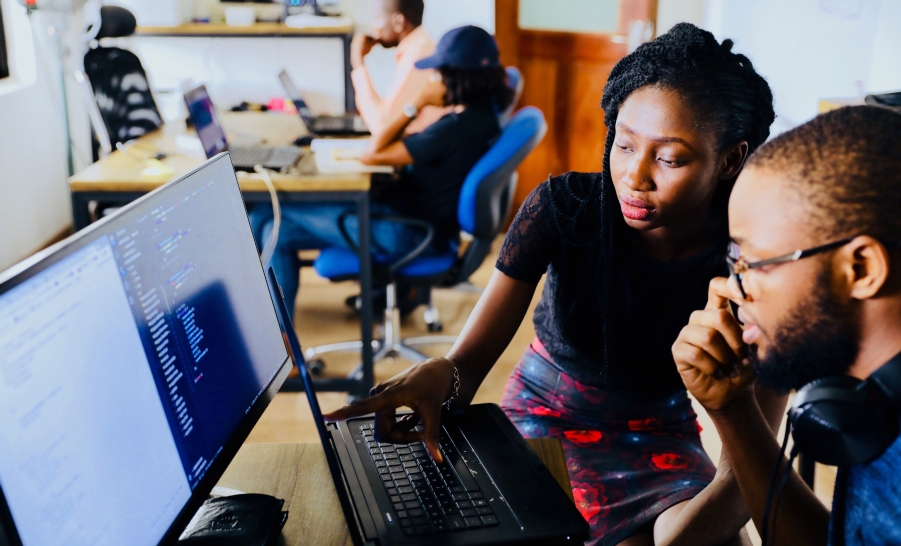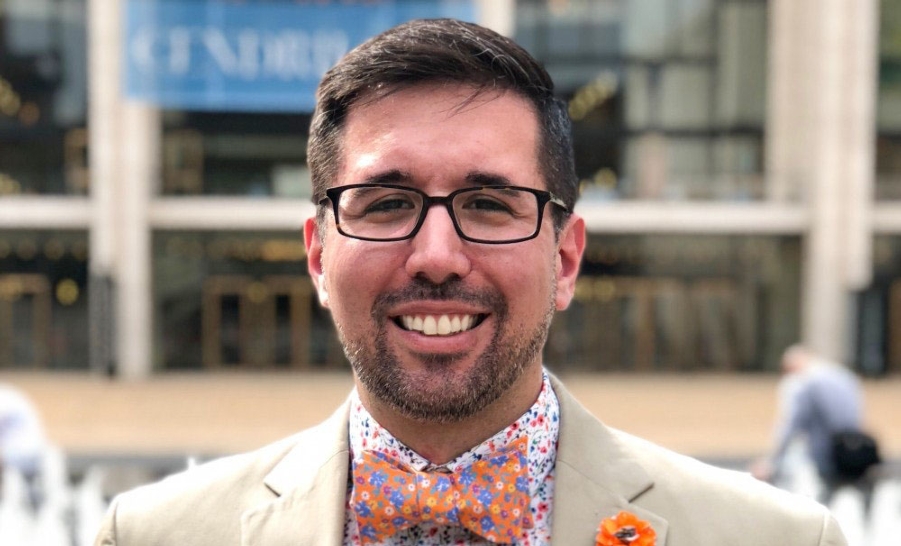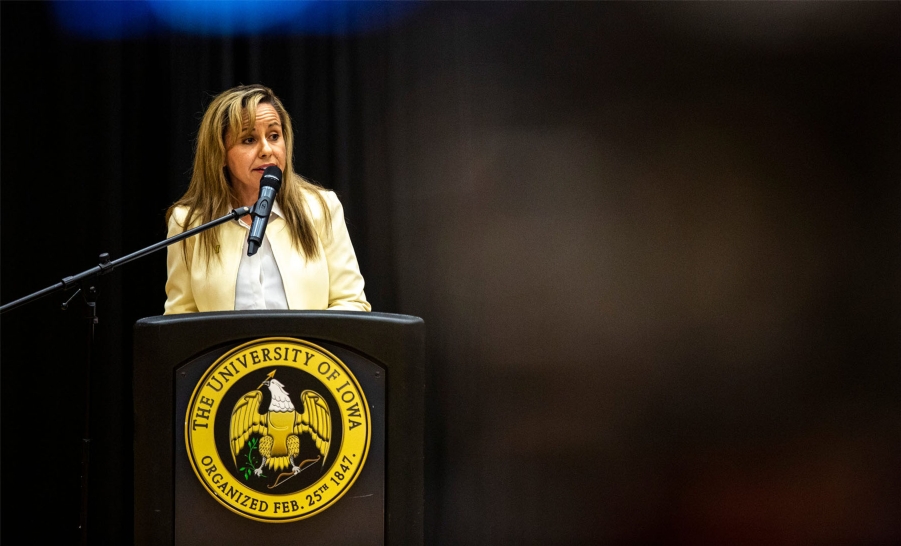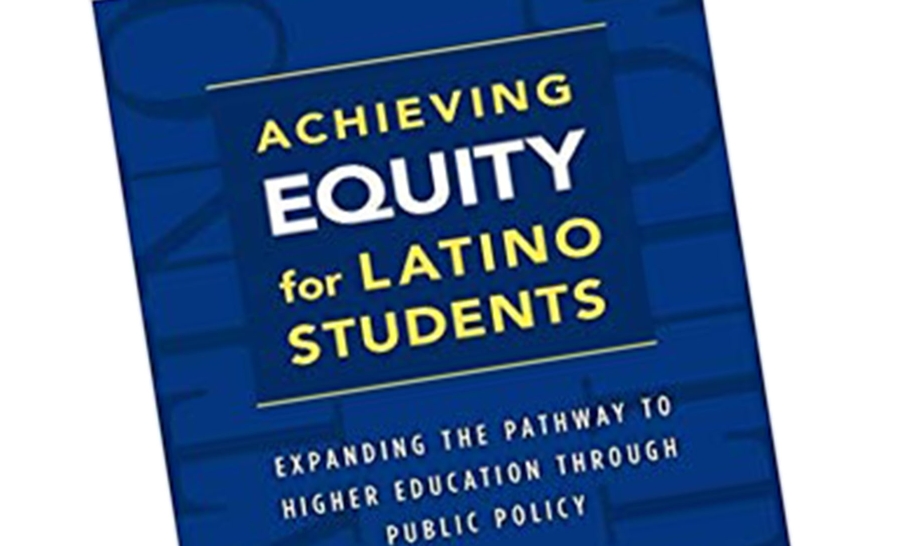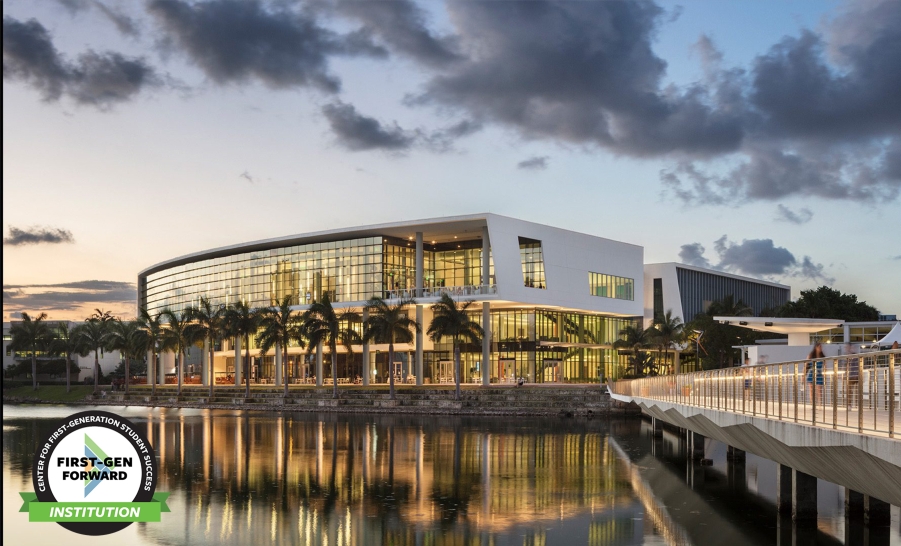ASU offers an innovative college pathway to students in the Yuma community
Mary Beth Faller, Arizona State University / FirstGen Forward / December 02, 2022
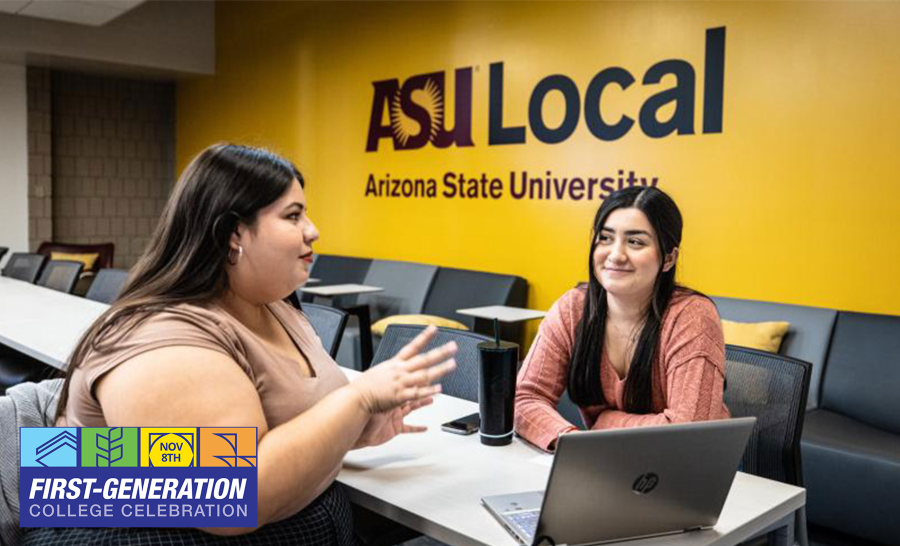
Navigating higher education can be difficult, and sometimes lonely, for students who are the first in their family to go to college.
Now, students who want to earn a bachelor’s degree while staying rooted in their community have another option—ASU Local, an innovative hybrid college program that pairs in-person coaching and mentorship as part of a tightly knit community with the flexibility of accessing all coursework online, 24/7, through ASU Online.
The hybrid undergraduate program from ASU is available in Los Angeles, Washington, D.C., and Yuma.
Launched earlier this year, ASU Local’s Yuma site has a cohort of 35 transfer students, most of whom are first-generation students.
As a group, these students can lean on one another while they take classes remotely and benefit from in-person, one-on-one coaching, tutoring, and programming.
“These students are deeply rooted in their communities,” said Elizabeth Vasquez, site director for ASU Local – Yuma and an Arizona State University alumna.
“It’s a big deal for us to support them locally. Being a first-generation here means it’s a family journey for our students.”
ASU Local – Yuma is housed on the campus of Arizona Western College, a two-year institution surrounded by agricultural fields. All of the ASU Local students in the Yuma location are transfers from Arizona Western. They attend academic and career-guidance programming once a week at the site, which also serves as a study lounge and community gathering spot.
“The ASU Local program is one of the many examples of how ASU supports learners from all backgrounds and stages in life,” said Maria Anguiano, executive vice president of ASU Learning Enterprise, which administers ASU Local. “Through ASU Local – Yuma, we acknowledge that students want to stay close to their family and friends for support, and their desire to contribute to and grow their own community while pursuing a degree from a major public research university.”
ASU Local – Yuma started in spring 2022 with 10 students, has 35 this semester and expects about 55 in spring 2023. The students, most of whom also have part- or full-time jobs, are required to take a minimum of 12 credits per semester and to meet with an academic success advisor four to six times per semester.
The breadth of the guidance they receive ranges from the practical, such as how to manage their coursework and obtain tutoring, to the existential, like the value of a degree to their lives.
ASU Local’s collaboration with Arizona Western College aims to double baccalaureate rates in the Yuma and La Paz counties to boost regional economic growth. About 22% of people in Yuma County have a bachelor’s degree, compared with 37% in all of Arizona, according to U.S. census data. Vasquez said that the students’ perseverance in college is notable in a city where many occupations don’t require a degree.
“Around here … you don’t necessarily need a degree [to find a job]. Sometimes that’s the question our learners will ask. ‘Do I really need the bachelor’s?’ When things get challenging, that’s when they start wondering if the college experience is worth it,” Vasquez said.
“That’s when we come back to the question of ‘What is your North Star? What is your why?’”
"THEY BELONG HERE"
The drive toward a bachelor’s degree starts at Arizona Western, where red-and-white signs reading “I’m going to college!” dot the sprawling campus.
Several of the ASU Local – Yuma students were in the College Assistance Migrant Program (CAMP) at Arizona Western, an academic and cultural support initiative with on-campus housing for young people who have a background in farmwork. Agriculture is the main industry in the Yuma area, which produces more than 90% of the country’s leafy greens in the winter.
“These students come from a background where maybe they had to wake up very early to cross the border,” said Rafael Encinas, academic advisor and transition coordinator for CAMP at Arizona Western. “Their parents maybe were not able to spend a lot of time with them because of always moving or working in the fields.
“So our students are hungry for acknowledgment and wanting to be a part of something. We try to develop a rapport to let them know they belong here.”
Miguel Mejia, a psychology major in the ASU Local – Yuma cohort, was in the College Assistance Migrant Program at Arizona Western, which gave him the sense of community he needed to pursue higher education.
“My dad didn’t finish high school. In his last year, he joined the Army in Mexico, and he did that for close to 11 years. After that, he’s been working in the fields and having different jobs, and growing up, he always told me the most important thing you have in your life is education, and he really wanted me to continue.
“So that’s always been my motivation — my family,” said Mejia, who wants to stay in the Yuma area after graduation and help other young people go to college.
The ASU partnership with Arizona Western ensures a smooth transfer of credits, a critical component so the students won’t have wasted time or money. When they transfer, they can choose from more than 140 undergraduate degrees available through the hybrid program.
The Yuma cohort has a range of majors. Vasquez said that criminal justice is common for students who want to work with the U.S. Customs and Border Protection or as correctional officers. Business is popular, too.
“Our students are entrepreneurs because being so close to the border, it’s a very entrepreneurial feel,” she said.
“Some of them have already launched small businesses in Mexico or online.”
Phil Regier is university dean for educational initiatives and CEO of EdPlus — the unit that houses ASU Online.
"Our goal with ASU Local, and in providing the opportunity for students to earn their degree through ASU Online, is to continue making accessible, quality education available to all learners, regardless of their physical location,” Regier said. “In working together with the ASU Learning Enterprise, ASU Local students not only have access to all of the support and engagement resources made available to our ASU Online students, but also have the unique opportunity to come together with and work alongside other ASU students in their community.”
BATTLING 'IMPOSTER SYNDROME'
A few weeks ago, Laura Juarez, the academic success advisor at ASU Local – Yuma, led a discussion about first-generation collegegoers.
Several of the students didn’t realize they were first-gen, never having heard the term before.
Typically, the concept isn’t taught until grad school, which is when Juarez and Vasquez first learned about it. That’s why the two women are making a conscious effort to explain first-generation challenges and strengths to the Yuma group.
Vasquez shared a personal story with the students about her time in grad school at ASU, when, late one night, she was reading a paper by researcher Laura Rendón describing the experiences of first-generation students.
Vasquez was so moved by what she was reading that she started crying and made a video of herself to send to a friend.
“And I remember just crying and just telling her, ‘This is us. There’s a story about us.’ We didn’t know it existed, and it wasn’t normalized. It was easy to feel like you’re the only one.
“Fast forward five years later, I actually met the researcher in person. I showed her the video and said, ‘Thank you for writing this and for impacting my path.’ And now she is one of my mentors.
“Laura (Juarez) and I aim to expose you to this research early on because you’re going through it now,” Vasquez told the group.
The students discussed how, even though their families were enormously supportive, they can’t fully grasp the university experience.
“They don’t know what you’re going through, and they don’t understand how difficult your classes are,” said Lizabeth Hernandez, a business administration major.
“Doubts still come to the surface, and it’s scary.”
They talked about “imposter syndrome” — persistent feelings of self-doubt no matter how much they accomplish.
Juarez described how, as a first-generation student herself, she left her community of San Luis to attend college and graduate school before returning to work at ASU Local – Yuma.
“It’s that feeling of, ‘Should I leave? Can I make it through?’” she said.
“You never stop being first-gen. I’m a first-gen professional, and I still feel that way sometimes,” she said.
“But there’s a beauty in it. We are navigating systems that are not meant for us.”
The point of the presentation was to explain that although they face challenges, such as financial difficulties or a sense of isolation, the students’ very presence in college shows strength and resilience.
The students studied the “community cultural wealth” model of researcher Tara Yosso, who delineated how first-generation students come with assets like “familial capital,” the values instilled by their families, or the “linguistic capital” of being bilingual.
Lorena Martinez, a business management major, said she wished she had known about the “cultural wealth” model when she was finishing her applications for scholarships.
“I was only in one club at (Arizona Western College). What else could I put (in the application)?” Martinez said.
“But looking at this, I realize I have so much more I could have talked about but I didn’t. We know more Spanish sometimes than English, and we might feel like that doesn’t make us enough to move forward or to move out of San Luis or Yuma, when in reality, it should push us to move forward.
“We already crossed one border, and we can cross another.”
"YOU CAN DO IT ON YOUR OWN"
When Gloria Gomez was in high school in Mexico, she wanted to go to college but didn’t see a path for her. Her family was low-income, and she didn’t think she would meet the requirements for attending a university in Mexico.
“I was upset because I dreamed my whole life of going to college,” she said.
“But my life changed when this person at church explained to me about community college, about FAFSA and how you can get your classes paid for.
“The scary part was that I had to do things on my own. It was completely new. I hadn’t been to the United States since I was in fourth grade. I was born here, but it felt like a foreign country to me.”
So Gomez attended Arizona Western before transferring to ASU Local – Yuma, where she is majoring in biological sciences with a concentration in biomedical sciences, and wants to be a family doctor. Her coursework is getting harder, making it even more critical to have resources such as year-round academic and career support through success coaches and in-person activities.
Student-centric programming covers a range of topics, from setting up a professional LinkedIn page to developing an elevator pitch for networking events.
“Being a first-generation student, learning how to assimilate into the country, learning the financial system, learning the school system—it all was an experience. But I’ve made it this far,” she said.
“I’m a very introverted person and it’s hard for me to ask for help, but I’ve learned throughout the years that you can’t do it on your own. There’s somebody who has to help you at some moment of your life.”
Gomez shares an apartment with her sister and works part time in retail while taking classes. She has worked hard at learning how to balance her responsibilities.
“You will shed a lot of tears, but overall, it will be worth it because you’ll have job satisfaction and more doors open to you in the future, and you’ll be able to say, ‘I made it through college, and I can make it through anything else.’“
She had advice for future STEM leaders in her community:
“I would say to Latina women, we need more of you in STEM. It’s not that scary.”
Arizona State University's 2022 First-Generation College Celebration was made possible by a $500 grant from the Center for First-generation Student Success and the Council for Opportunity in Education. Learn more about their celebration here!
